
The American goldfinch is a small North American bird in the finch family. It is migratory, ranging from mid-Alberta to North Carolina during the breeding season, and from just south of the Canada–United States border to Mexico during the winter.
The Peace of Callias is a purported peace treaty established around 449 BC between the Delian League and Persia, ending the Greco-Persian Wars. The peace was agreed as the first compromise treaty between Achaemenid Persia and a Greek city.

The common myna or Indian myna, sometimes spelled mynah, is a bird in the family Sturnidae, native to Asia. An omnivorous open woodland bird with a strong territorial instinct, the common myna has adapted extremely well to urban environments.
Callias was an Ancient Greek statesman, soldier and diplomat, active in 5th century BC. He is commonly known as Callias II to distinguish him from his grandfather, Callias I, and from his grandson, Callias III, who apparently squandered the family's fortune.

Nyctanthes arbor-tristis, also known as the Night-flowering jasmine and Parijat(Parvati chi phula) is a species of Nyctanthes native to South Asia and Southeast Asia.
Callias was an ancient Athenian aristocrat and political figure. He was the son of Hipponicus and an unnamed woman, an Alcmaeonid and the third member of one of the most distinguished Athenian families to bear the name of Callias. He was regarded as infamous for his extravagance and profligacy.
Callias of Chalcis, son of Mnesarchus, together with his brother Taurosthenes, succeeded his father as tyrants of Chalcis. Callias formed an alliance with Philip of Macedon against Plutarch, tyrant of Eretria, with the view of extending his authority over the whole of Euboea, a design which, according to Aeschines, he disguised as a plan for uniting in one league the states of the island and establishing a general Euboean congress based at Chalcis.
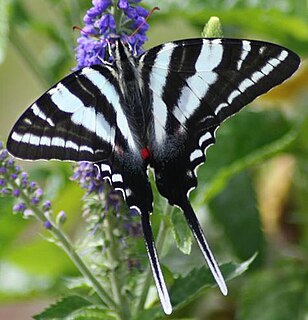
Eurytides is a genus of butterflies in the family Papilionidae, found in North, Central, and South America.
Callias, sometimes called by the nickname Schoenion (Σχοινίων), was a poet of the Old Comedy, not to be confused with the three Athenian aristocrats named Callias, the last of which, Callias III, appears in Plato's Protagoras.
Hermogenes was an ancient Athenian philosopher best remembered as a close friend of Socrates as depicted by Plato and Xenophon.
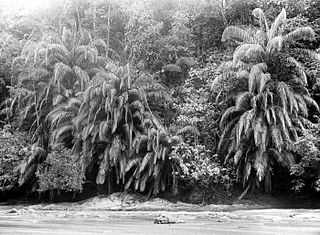
Eugeissona is a clustering genus of flowering plant in the palm family native to Borneo, Thailand and Malaysia. The six monoecious species provide a wide range of local uses and are commonly called bertam or wild Bornean sago. The genus is the sole representative of the Eugeissoninae having very few obvious relatives; the hermaphrodite and staminate flowers are also found in Metroxylon, however the other specialized characteristics are unique suggesting an early split and differentiation from other members of the Calameae. Fossilized pollen belonging to these plants has been recovered in the lower and middle Miocene deposits in Sarawak. The name is from two Greek words meaning "good" and "roof", due to their common use in roof thatching.
Callias was the head of a wealthy Athenian family.
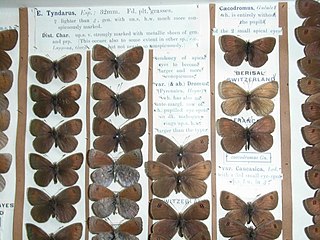
The brassy ringlets are a species group of ringlet butterflies in the genus Erebia. Though closely related, their monophyly is not completely resolved. Still, the brassy ringlets are taxa similar to E. tyndarus – the Swiss brassy ringlet –, and in many cases certainly close relatives. A notable trait of their genus is an ability to adapt well to cold and somewhat arid habitat, like taiga or regions with alpine climate. Optimal habitat in Eurasia, where most of the brassy ringlets are found, therefore occurs in two distinct belts – in the very north of the continent and in the Alpide belt – in interglacials, and in glacials in one periglacialic belt at lower altitude, in places interrupted by dry wasteland and deserts.
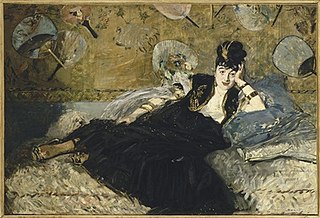
Anne-Marie Gaillard, known as Nina de Villard de Callias, Nina de Callias or Nina de Villard, was a French composer, pianist, writer, and salon hostess.

The black-headed monitor or black-tailed monitor is a relatively small species of monitor lizards native to Australia. It is occasionally also called the mournful monitor, freckled monitor or the racehorse monitor, a name it shares with the Gould's monitor due to their exceptional speed. It is placed in the subgenus Odatria.

Erebia callias, the Colorado alpine, is a member of the Satyridae subfamily of the Nymphalidae butterflies. It is found in alpine areas of Wyoming and Colorado in the U.S. Rocky Mountains as well as various mountain ranges in eastern Asia.
Calliini is a tribe of longhorn beetles of the subfamily Lamiinae.
Callia is a genus of longhorn beetles of the subfamily Lamiinae.
Hydroptila callia is a species in the family Hydroptilidae ("microcaddisflies"), in the order Trichoptera ("caddisflies"). Hydroptila callia is found in North America.
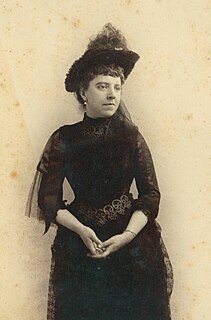
Nancy Fish Barnum Callias D'Orengiani, Baroness was an English socialite who was the second wife of P. T. Barnum. The daughter of a successful English cotton mill owner, she started a relationship with Barnum, who was 40 years her senior. After the death of Barnum's first wife in 1873, they married the following year in both London and New York City. After his death in 1891, Barnum left Fish a large annuity, making her a wealthy widow.









